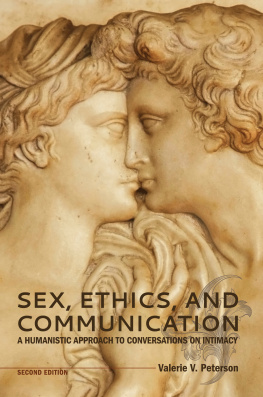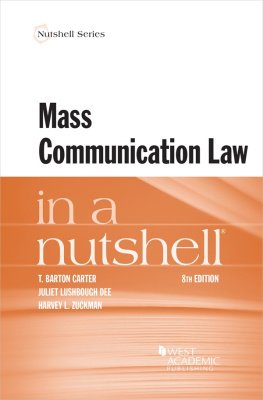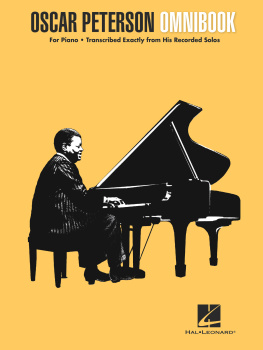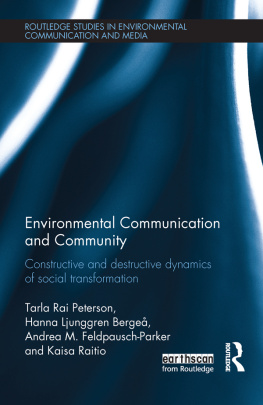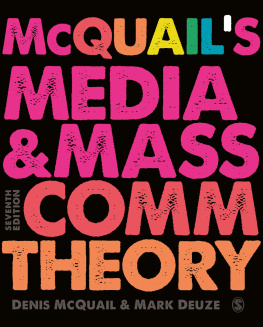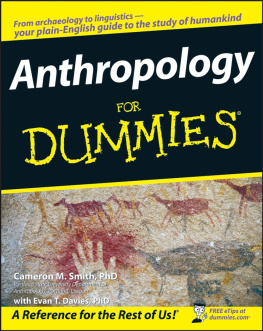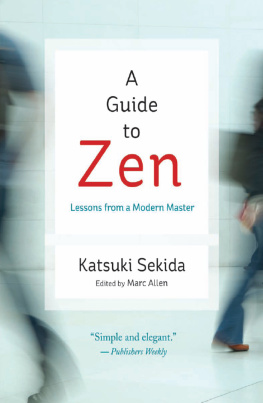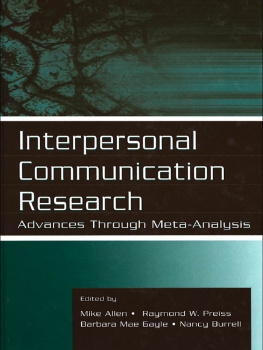Anthropology & Mass Communication
Anthropology &
General Editors: William O. Beeman and David Kertzer, Department of Anthropology, Brown University
Anthropology & Law
James M. Donovan and H. Edwin Anderson, III
Anthropology & Mass Communication: Media and Myth in the New Millennium
Mark Allen Peterson
ANTHROPOLOGY & MASS COMMUNICATION
Media and Myth in the New Millennium
Mark Allen Peterson
First published in 2003 by
Berghahn Books
www.BerghahnBooks.com
First paperback edition published in 2005
Paperback reprinted in 2008
2003, 2005, 2008 Mark Allen Peterson
All rights reserved. Except for the quotation of short passages for the purpose of criticism and review, no part of this book may be reproduced in any form or by any means, electronic or mechanical, including photocopying, recording, or any information storage and retrieval system now known or to be invented, without written permission of the publisher.
The author and publisher greatly acknowledge the right to reproduce the extract on from Nice Work David Lodge. Used by permission of The Random House Group Limited and Viking Penguin, a division of Penguin Group (USA) Inc.
Library of Congress Cataloging-in-Publication Data
Peterson, Mark Allen.
Anthropology & mass communication : media and myth in the new millenium / Mark Allen Peterson.
p. cm. -- (Anthropology &)
Includes bibliographical references and index.
ISBN 1-57181-277-6 (alk. paper) -- ISBN 1-57181-278-4 (pbk.: alk. paper)
1. Mass media and anthropology. I. Title. II. Series.
P96.A56P48 2003
302.23'4--dc21 2003052307
British Library Cataloguing in Publication Data
A catalogue record for this book is available from the British Library
CONTENTS
To Dawna, of course
ACKNOWLEDGMENTS
This manuscript owes a debt to many people.
Much of my thinking about media was shaped by two three-year stints as a political journalist in Washington, DC. I would like to thank everyone there who helped me learn, and learn about, American journalism, especially Howard Haugerud, John Carroll, Fred Geiger, and Dick Maggrett. I have also drawn heavily on my fieldwork in India, where I owe a debt of gratitude to many reporters and editors at Times of India, Nav Bharat Times, Sandhya Times, Indian Express, Janasatta, Milap, Pratap, and others.
Many of my ideas were refined during the Media Anthropology Summer School at the University of Hamburg in 1999. I would like to thank Dorle Drackl, who organized the summer school, the Volkswagen Foundation, who sponsored it, my fellow faculty members, especially David Hakken, Debra Spitulnik, Merry Bruns, Penelope Harvey, and Mark Pedelty, and the students, especially John Postill and Barbara Zang. Special thanks go to Mark and John for their reading and careful comments on early drafts of some of the chapters.
My thanks go out to Marion Berghahn, for her enthusiasm about this project, to Shearin Abdel-Moneim and Christy Ferguson, who spent a hefty part of their graduate education locating citations and entering my copyediting corrections, and to my secretary, Safaa Sedky, for her contributions.
I would like to thank my colleagues at the American University in Cairo, especially Donald Cole, who commented on an early draft of . Many of the ideas expressed here were first tried out in my course on media, culture, and society in the Islamic world. I thank all my students, but especially Dalia al-Amroussey, Ahmed Bassiouni, Frederic Copper-Royer, Elizabeth Cooper, Jack Dolph, Yasmine el-Dorghamy, Yvette Fayez, Mamdouh Hakim, Samar Ibrahim, Natalia Kasprzak-Suit, Sandra Khalifa, James Lejukole, Ivan Panovi, Sridevi Raman, Louly Seif, and Wesam Younis for asking tough questions and bringing to class their own insights and examples.
My anthropological perspective on mediaand on everything elsehas been primarily shaped by three superb mentors: William O. Beeman, Jon Anderson, and Phyllis Chock. All of my best work in anthropology is in some way derived from their teaching and example; the errors and lapses, alas, are mine alone.
I thank my daughters, Madison, Thea, and Sophie, for their open and insightful discussions of their own and their peers encounters with media, for introducing me to the world of Pokmon, and for their constant encouragement, even when the manuscript for this book consumed time that would have been better spent with them.
Finally, my greatest debt is owed to my wife, Dawna, who has supported me in this, and in all my projects, for over eighteen years.
INTRODUCTION
I have dabbled in media at least since junior high school, when my father bought me a used 8mm movie camera. My productions were fundamentally intertextual, pastiches and parodies of the television and films I enjoyed viewing. They were also fundamentally social activities, ways for a loud, socially inept adolescent to bring together a group of male and female comrades, some of whom might not otherwise have wanted anything to do with me. I went to Mayo High School in Rochester, Minnesota, one of the first secondary schools in America to have a fully fledged television production studio, and at sixteen I was producing (with a crew of six) a daily, two-minute humorous segment for the schools daily ten-to-fifteen minute broadcast, The Spartan Scene.
While an undergraduate majoring in the study of religion at UCLA, I freelanced for magazines and newspapers, and discovered a lucrative niche producing institutional newsletters. I was hired to write a screenplay treatment for a movie about King David, which was never made (the funding collapsed when Variety announced Dino DeLaurentis was planning a movie on the same subject starring Richard Gere). Accompanying my wife to the east coast to pursue her M.Ed., I learned computer typesetting as a text editor for law books at the Michie Company in Virginia. When my wife found a job in Washington, DC, I began taking classes in anthropology at the Catholic University of America, and I became assistant editor of Anthropological Quarterly. Needing a job, I lucked into an assistant editorial position at the National Tribune Co., where for three years I learned the mysteries of the Washington Press Corps. The Trib, as we affectionately called it, published watchdog publications on the U.S. Department of Veterans Affairs (and its predecessors), several congressional committees and some departments of the Pentagon. It was a great place to work. Hours were flexible, pay was low, and turnover high; an assistant editor might find himself off to cover a congressional hearing or interviewing a senator because no reporters were available.
I kept my anthropology and my journalism as separate as possible during this period, in part because I recognized that their epistemologies were incompatible. Journalism is founded on common sense, while anthropology scrutinizes common sense and analyzes it. My concerns about mixing the two were realized when I began taking a course from Jon Anderson on performance and practice theories in anthropology, and realized that the mythmaking of the peoples I was studying and the mythmaking by which I made my livelihood were too similar to ignore. Things came to a head after President Reagan announced that the United States was fighting a war on drugs and I was confronted with the ways my own institutionalized practices as a journalist were objectifying a metaphor I absolutely did not believe in.




